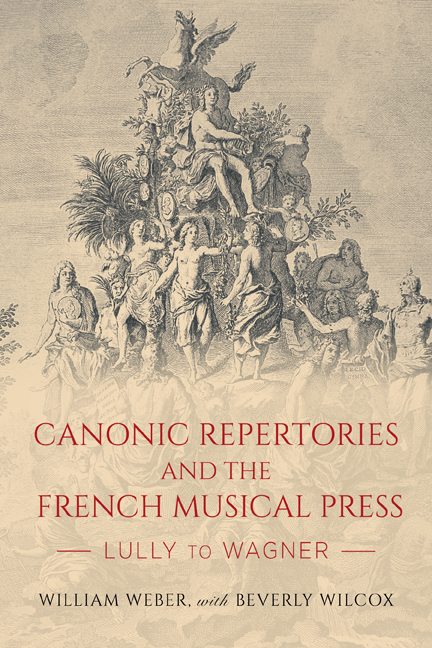Book contents
- Frontmatter
- Contents
- Acknowledgments
- List of Illustrations
- Introduction
- 1 The Domestic versus the Foreign in Eighteenth-Century Paris and London
- 2 Elements of Canon Formation at the Concert Spirituel (Beverly Wilcox)
- 3 To Praise or to Criticize? The Evolution of Music Criticism in Eighteenth-Century France
- 4 Haydn in the Press during the 1780s: How Did a Canon Arise?
- 5 Parallel Canons at the Opéra and the Comédie-Française at the End of the Ancien Régime
- 6 Negotiating Canonic Repertory and les progrès de la musique at the Paris Opéra, 1815–1830
- 7 The Evolution of le vieux répertoire at the Opéra-Comique in the Nineteenth Century
- 8 Richard Wagner, Concert Life, and Musical Canon in Paris, 1860–1914
- An Afterword
- Bibliography
- Index
3 - To Praise or to Criticize? The Evolution of Music Criticism in Eighteenth-Century France
Published online by Cambridge University Press: 26 May 2022
- Frontmatter
- Contents
- Acknowledgments
- List of Illustrations
- Introduction
- 1 The Domestic versus the Foreign in Eighteenth-Century Paris and London
- 2 Elements of Canon Formation at the Concert Spirituel (Beverly Wilcox)
- 3 To Praise or to Criticize? The Evolution of Music Criticism in Eighteenth-Century France
- 4 Haydn in the Press during the 1780s: How Did a Canon Arise?
- 5 Parallel Canons at the Opéra and the Comédie-Française at the End of the Ancien Régime
- 6 Negotiating Canonic Repertory and les progrès de la musique at the Paris Opéra, 1815–1830
- 7 The Evolution of le vieux répertoire at the Opéra-Comique in the Nineteenth Century
- 8 Richard Wagner, Concert Life, and Musical Canon in Paris, 1860–1914
- An Afterword
- Bibliography
- Index
Summary
The critical review—called in French the compte rendu—has been an intellectual focal point in musical culture during the modern epoch. Since early in the nineteenth century newspapers and magazines have featured critical reviews written soon if not immediately after a concert or an opera. The brief evaluative report became central to modern journalism and served as a major institution within a city's musical life. Such pieces have usually been focused closely upon the event in some depth, unlike essay-like writing, which would explore broader aspects of what was going on within musical culture. It has normally been assumed that the writer of an evaluative review approaches the event as an independent authority, even though that may be open to question. Historical study of music criticism has been focused chiefly upon famous journalists and notorious controversies, with limited discussion of conventions by which such writers formulated reviewing. This chapter is intended to explore how critical pieces emerged in eighteenth-century France, examining the professional practices followed by those who wrote pieces on the Concert Spirituel for the Mercure de France, the central French magazine of the eighteenth century. Beverly Wilcox has established the starting-point for this discussion in Chapter 2, showing how centrally canonic repertory figured in the lifetime of that series. It is vital then to inquire how journalists came to grips with critical discussion of music—whether new or old—if we are to understand more deeply the intellectual framework within which a musical canon might arise.
Looking back at the major critics of the nineteenth century brings to mind several diverse such writers—François-Joseph Fétis, Hector Berlioz, James Davison, Robert Schumann, and Eduard Hanslick—whose approaches set up models for music criticism in Europe as a whole. That raises the question of whether they followed any precedents from journalism in the late eighteenth century, and whether significant activity developed in such writing back then. During the 1780s certain musical reports became focused closely on critical assessment of a concert or an opera, as distinct from the wide-ranging literary essays that usually were written about music. We will look into the reports about the Concert Spirituel published in the Mercure de France, which approached the kind of writing that emerged during the early nineteenth century.
- Type
- Chapter
- Information
- Canonic Repertories and the French Musical PressLully to Wagner, pp. 73 - 101Publisher: Boydell & BrewerPrint publication year: 2021



